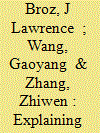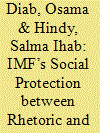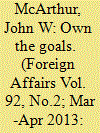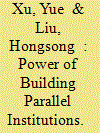|
|
|
Sort Order |
|
|
|
Items / Page
|
|
|
|
|
|
|
| Srl | Item |
| 1 |
ID:
172829


|
|
|
|
|
| Summary/Abstract |
We analyze the factors that increase the likelihood that other nations will follow China's global economic leadership. While our theoretical framework incorporates the conventional argument that China pulls in followers with economic benefits, we focus on grievances with the current global order that have the effect of pushing countries toward the rising new leader. We find that grievances about global financial instability are particularly important push factors. Our results show that countries that have experienced more financial crises, more variable capital account policies, more volatile portfolio capital outflows, and more social unrest during IMF programs are more likely to support China's global leadership than leaders of nations that have been less exposed to these problems. We find no evidence that grievances about global governance, or grievances about discriminatory US trade policies, are related to foreign support for China's global economic leadership. Overall, our evidence is consistent with the interpretation that leaders want to reform and preserve the WTO and the IMF, which have worked reasonably well for them under US leadership. At the same time, they have incentives to follow China's economic leadership on global capital flows, emphasizing long-term infrastructure and development finance over short-term flows which, under the current order, have imposed large costs on many economies.
|
|
|
|
|
|
|
|
|
|
|
|
|
|
|
|
| 2 |
ID:
181814


|
|
|
|
|
| Summary/Abstract |
A substantial body of literature has been produced about the IMF’s drift away from neoliberal orthodoxy in the aftermath of the 2007/08 global financial crisis. This article assesses the degree to which the IMF’s post-crisis change in discourse toward adding more emphasis on social protection was put into action in Egypt’s 2016 economic reform program. Beyond a noticeable discursive change, our research found that there was very little—if any—practical change. First, we demonstrate how the social component of the program was much smaller than the neoliberal or ‘business-as-usual’ component, not only as a share of program measures but also in terms of their magnitude. Second, we found that even this small component had a very similar equivalent in the last major program between the IMF and Egypt in 1991, thus rendering it less novel, and therefore casting doubt on the IMF’s claims of change.
|
|
|
|
|
|
|
|
|
|
|
|
|
|
|
|
| 3 |
ID:
117979


|
|
|
|
|
| Publication |
2013.
|
| Summary/Abstract |
Since their inception in 2000, The Millennium Development Goals have revolutionized the global aid business, using specific targets to help mobilize and guide development efforts. They have encouraged world leaders to tackle multiple dimensions of poverty simultaneously and provided a standard for judging performance. As their 2015 expiration looms, the time has come to bank those successes and focus on what comes next.
|
|
|
|
|
|
|
|
|
|
|
|
|
|
|
|
| 4 |
ID:
187975


|
|
|
|
|
| Summary/Abstract |
China has been a proponent of global governance reform, but its reform strategy does not remain constant. In the wake of the Global Financial Crisis, its political opportunities were depleting when dominant states, especially the United States, were recovering from the crisis. As a result, the promised 2010 International Monetary Fund (IMF) reform package failed to materialize under Beijing’s old reform strategy of making overt proposals. We argue that Beijing’s goal of the IMF reform was achieved through the creation of the Asian Infrastructure Investment Bank. To advance reform, the newly-created institution needs to have sufficient governance capacity to ensure its effectiveness, produce policy outcomes close to Beijing’s preferences, and operate in an issue area competing for resources with the established institution, the IMF, but not necessarily in the same issue area as is required by the literature of contested multilateralism.
|
|
|
|
|
|
|
|
|
|
|
|
|
|
|
|
| 5 |
ID:
101982


|
|
|
|
|
| Publication |
2010.
|
| Summary/Abstract |
LIKE THE CURRENT GLOBAL CRISIS, the Asian financial and economic crisis of 1997 and 1998 was not just a cyclic event. As a general rule, events of this kind end up in a search for mechanisms that forestall or cushion a future crisis somehow. At the turn of the centuries waves of trouble tend to rise, in the first place, in financial sphere. Hence, it is natural to see attempts to mend it in a new way at both global and regional levels. In East Asia, the Chiang Mai Initiative (CMI) is a striking example of regional financial cooperation.
|
|
|
|
|
|
|
|
|
|
|
|
|
|
|
|
| 6 |
ID:
019499


|
|
|
|
|
| Publication |
Summer 2001.
|
| Description |
199-211
|
|
|
|
|
|
|
|
|
|
|
|
|
|
|
|
|
|
|
|
|